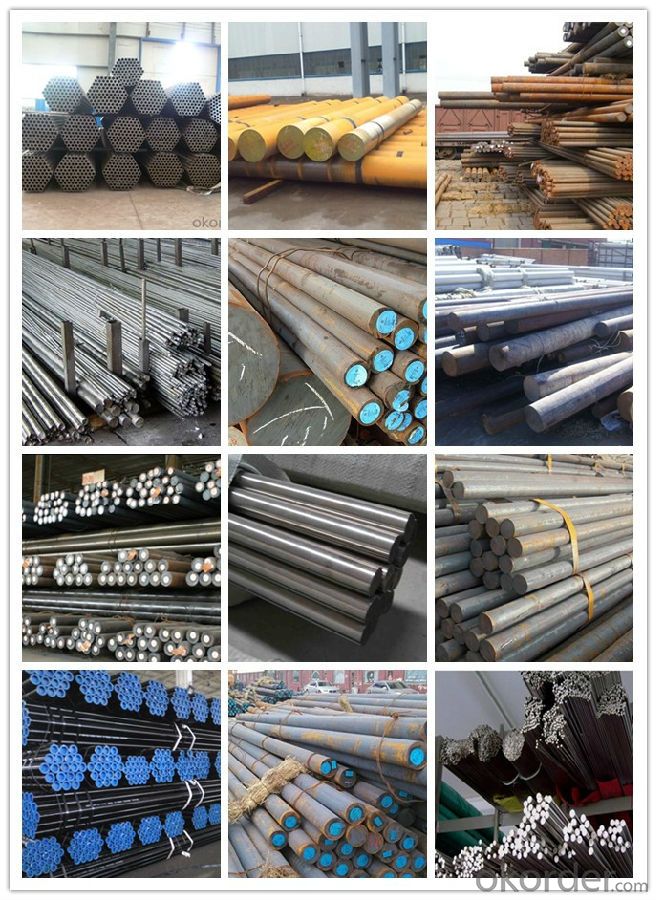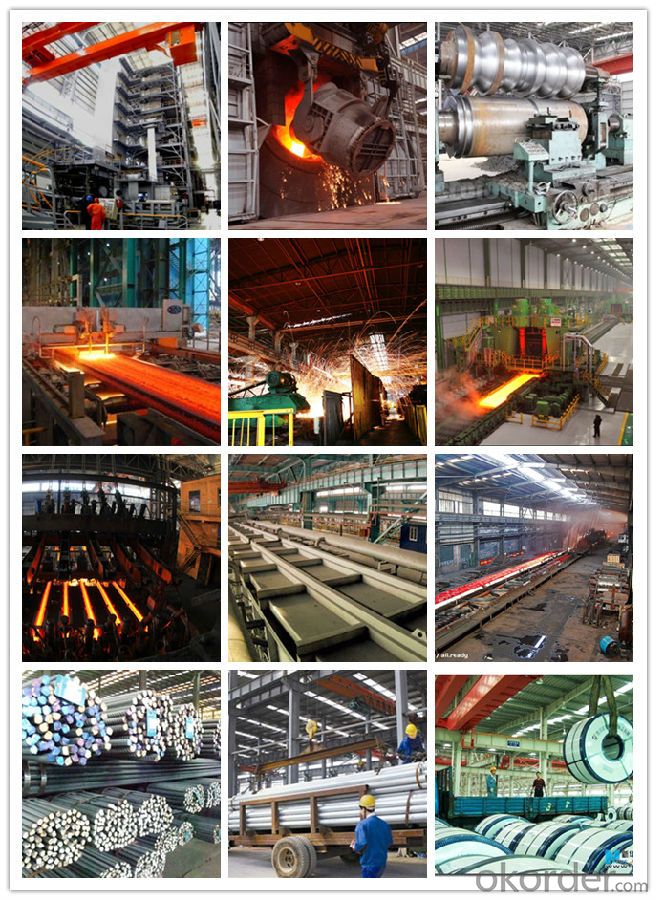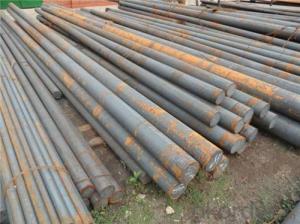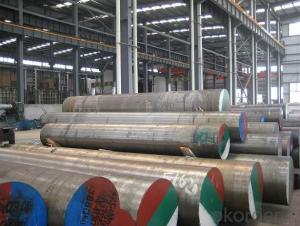JIS Scr420,DIN 20Cr4,SAE 5120, Alloy Steel Bar
- Loading Port:
- China main port
- Payment Terms:
- TT or LC
- Min Order Qty:
- 25 m.t.
- Supply Capability:
- 10000 m.t./month
OKorder Service Pledge
OKorder Financial Service
You Might Also Like
Item specifice
JIS Scr420,DIN 20Cr4,SAE 5120, Alloy Steel Bar
Product information:
Hot rolling craftwork and fine mechanical performance
Chemical components meet standards, delivery in black skin
Standards: a) JIS Scr420 b) Din 20Cr4 c) ASTM 5120 d)GB/T3077 20Cr
Size: dia 16-200mm
Length:6M above
Packing:Bundles
Product show

Product detail:
1. Delivery condition: Hot-rolled,black surface. Hot forged +Rough machined (black surface after Q/T)+ Turned (optional), Cold-drawn Conditionm, Q+T with black surface.
2. Chemical composition: %
| C | Si | Mn | P | S | Cr |
| 0.18-0.24 | 0.17-0.37 | 0.7-1.0 | ≤0.03 | ≤0.030 | 0.5-0.9 |
3. Process: EAF + LF + VD + Forged + Heat Treatment (optional)
4. Technical Data: According to the customer's requirement of Chemical Composition, Physical Properties and Mechanical Testing
5. Test: ultrasonic test according to SEP 1921-84 3C/c
6. Material details will be as per agreed technical specifications
7. Certificate of Quality: issued in English, in addition the normal terms, production process, the mechanical property (yield strength, tensile strength, elongation and hardness), forged ratio, UT test result, Grain size, heat treatment methods and the sample of is shown on the Certificate of Quality.
Workshop show

Our service:
-High manufacturing accuracy
-High strength
-Small inertia resistance
-Strong heat dissipation ability
-Good visual effect
-Reasonable price
Chose happens because of quality, then price, We can give you both.Additionally, we can also offer professional products inquiry, products knowledge train(for agents), smooth goods delivery, exellent customer solution proposals.Our service formula: good quality+good price+good service=customer's trust
SGS test is available, customer inspection before shipping is welcome, third party inspection is no problem.
If you need the sample, please feel free to let me know. Any question, we will contact you ASAP!
Alloy steel is a kind of steel in addition to containing silicon and manganese as alloying elements and deoxidizing elements, but also contains other alloy elements such as chromium, nickel, molybdenum, vanadium, titanium, copper, tungsten, aluminum, cobalt, niobium, zirconium and other elements, and some also contain some nonmetallic elements (such as boron, nitrogen, etc.) of the steel. Alloy steel due to the presence of different kinds and quantities of alloying elements and take appropriate measures in the process, can be respectively, with high strength, toughness, quenching through resistance, abrasion resistance, corrosion resistance, resistance to temperature resistance, heat resistance and other special properties.
Alloy steel bar is mainly applicable to drill, milling cutter, reamer. It can also be used for cutting, stamping and measuring tools. It is used in the paper, packaging, printing, non-ferrous metal processing industry. In addition, it is also widely used for processing high-speed steel cutting tool, hard alloy cutter, hard alloy cutting tools, NAS cutting tool, air tool, hard alloy bit, cutter from core bit, high speed steel, taperd milling cutter, cutter metric, micro end milling cutter, the hinge pilot, electronic tools, drilling ladder, metal cutting saw, double assurance diamond, guns, angle cutter, tungsten carbide rotary burrs, hard alloy cutting tools and so on.
- Q:How does special steel contribute to the medical aftermarket industry?
- The medical aftermarket industry heavily relies on special steel, which is essential for producing top-quality materials needed for medical devices and equipment. Special steel, also known as stainless steel, offers a wide range of advantages that make it perfect for medical applications. Above all, special steel's resistance to corrosion and rust is of utmost importance in the medical field, where hygiene and cleanliness are crucial. Medical devices like surgical instruments, implants, and equipment require frequent sterilization, and the corrosion resistance of special steel guarantees their durability and long-lasting nature. Moreover, special steel possesses exceptional strength and hardness properties, making it suitable for medical implants and prosthetics. These implants must be able to withstand the stresses and strains of the human body while maintaining their structural integrity. Special steel provides the necessary strength and toughness required for these critical applications. Furthermore, special steel is biocompatible, meaning it does not cause any negative reactions or toxicity when it comes into contact with living tissues. This characteristic is vital for implants and devices that directly interact with the human body, as it minimizes the risk of rejection or allergic reactions. Additionally, special steel's versatility allows for easy machining and fabrication into complex shapes and sizes, meeting the diverse requirements of medical applications. It can be shaped into delicate surgical instruments, precise cutting tools, and even large-scale equipment like hospital beds and imaging machines. The high precision and dimensional stability of special steel contribute to the accuracy and reliability of medical devices, especially in areas like diagnostics and imaging. Precise measurements and high-quality images are essential for accurate diagnosis and treatment planning, and special steel helps achieve these goals. In conclusion, special steel's corrosion resistance, strength, biocompatibility, and versatility make it an invaluable material in the medical aftermarket industry. Its use in manufacturing medical devices and equipment ensures the highest standards of hygiene, durability, and performance, ultimately contributing to the advancement of healthcare and improving patient outcomes.
- Q:How does special steel contribute to the power generation industry?
- Special steel plays a crucial role in the power generation industry by providing the necessary strength, durability, and resistance to extreme temperatures and corrosive environments. It is used in the construction of turbines, generators, and other critical components, ensuring the efficient and reliable operation of power plants. Additionally, special steel's high heat resistance and excellent mechanical properties enable power plants to operate at higher temperatures, increasing energy efficiency and reducing emissions.
- Q:How is free-cutting steel used in the manufacturing of screws and bolts?
- Free-cutting steel is used in the manufacturing of screws and bolts due to its exceptional machinability. It contains elements such as sulfur, phosphorus, lead, or selenium that act as lubricants during the cutting and machining process. These elements help to break the chips and reduce the friction between the metal and the cutting tool, resulting in improved efficiency and reduced tool wear. This type of steel enables faster production rates and higher precision in screw and bolt manufacturing.
- Q:How does special steel perform in terms of creep resistance at elevated temperatures?
- Special steel is known for its excellent performance in terms of creep resistance at elevated temperatures. Creep refers to the gradual deformation of a material under constant stress at high temperatures over an extended period. Special steel, specifically designed to withstand high temperatures, demonstrates a remarkable ability to resist creep and maintain its structural integrity. The unique composition of special steel, which includes various alloying elements such as chromium, molybdenum, and vanadium, contributes to its exceptional creep resistance. These alloying elements enhance the steel's high-temperature strength, increase its resistance to deformation, and inhibit the formation of detrimental microstructural changes that can occur during creep. Furthermore, special steel undergoes specific heat treatment processes, such as quenching and tempering, which further enhance its creep resistance. These processes help refine the steel's microstructure, resulting in a fine-grained and homogenous material that can resist deformation even under prolonged exposure to high temperatures. The superior creep resistance of special steel makes it a preferred choice in various industries that operate under high-temperature conditions, such as power generation, petrochemical, and aerospace. It allows for extended service life, reduced maintenance, and increased safety in critical applications where failure due to creep deformation could have severe consequences. In summary, special steel exhibits exceptional performance in terms of creep resistance at elevated temperatures. Its unique composition, including alloying elements and specific heat treatment processes, enables it to resist deformation and maintain its structural integrity even under prolonged exposure to high temperatures.
- Q:What is the difference between general steel and special steel?
- Pu steel: full name ordinary steel, mostly with plates, profiles and wire form. Ordinary steel is the basic material of the earliest, the largest amount of use in industry, widely used in architectural structure, bridge components, hull structure, transportation, machinery manufacturing, agriculture, textile, defense industry, metal products, food industry, household appliances and other various departments of the national economy.
- Q:What are the different methods of machining special steel?
- There are several different methods of machining special steel, each with its own advantages and applications. Some of the most common methods include: 1. Turning: Turning is a machining process that involves rotating a workpiece while a cutting tool removes material from the surface. This method is typically used to create cylindrical shapes and can produce high-quality finishes. 2. Milling: Milling is a versatile machining method that uses rotary cutters to remove material from a workpiece. It can be used to create complex shapes and contours, and is often employed in the production of special steel components. 3. Drilling: Drilling is a machining process that involves creating holes in a workpiece using a rotating cutting tool. It can be used to create both through holes and blind holes in special steel, and is commonly used in various industries. 4. Grinding: Grinding is a precision machining method that uses an abrasive wheel to remove material from a workpiece's surface. It is often used to achieve tight tolerances and smooth finishes on special steel components. 5. Broaching: Broaching is a machining process that uses a sharp cutting tool with multiple teeth to remove material in a series of linear cuts. It is commonly used to create keyways, splines, and other intricate shapes in special steel. 6. Electrical Discharge Machining (EDM): EDM is a non-traditional machining method that uses electrical discharges to remove material from a workpiece. It is particularly useful for machining special steel with complex shapes or for creating small features. 7. Laser Cutting: Laser cutting utilizes a high-powered laser to cut through special steel with extreme precision. It is commonly used for intricate designs and can produce smooth edges without the need for subsequent processing. Each of these methods has its own advantages and limitations, and the choice of machining method depends on factors such as the desired outcome, the complexity of the part, and the properties of the special steel being machined.
- Q:What are the international standards for special steel?
- The international standards for special steel vary depending on the specific type and application of the steel. However, some widely recognized international standards organizations, such as the International Organization for Standardization (ISO) and the American Society for Testing and Materials (ASTM), provide guidelines and specifications for special steel in terms of composition, mechanical properties, and performance. These standards ensure uniformity and quality control in the production and usage of special steel across different countries and industries.
- Q:Can special steel be used in the production of turbine blades?
- Yes, special steel can be used in the production of turbine blades. Special steel, such as superalloys, offers excellent high-temperature strength, corrosion resistance, and fatigue resistance, making it ideal for turbine blade applications where these properties are crucial for optimal performance and durability.
- Q:How does special steel contribute to the corrosion resistance of products?
- Special steel contributes to the corrosion resistance of products through its unique composition and manufacturing processes. It is specifically designed to have a higher resistance to corrosion compared to regular steel. Special steel contains various alloying elements such as chromium, nickel, and molybdenum, which form a protective layer on the surface of the steel, preventing the corrosive agents from reaching the underlying metal. Additionally, the manufacturing techniques used for special steel, such as heat treatment and controlled cooling, further enhance its corrosion resistance properties. Overall, special steel plays a crucial role in ensuring the durability and longevity of products by minimizing the effects of corrosion.
- Q:How does special steel perform in high-stress corrosion cracking environments?
- Special steel performs exceptionally well in high-stress corrosion cracking environments. Due to its unique composition and enhanced resistance to corrosion, special steel can withstand the combination of mechanical stress and corrosive agents, minimizing the risk of cracking or failure. This makes it a highly reliable and preferred material choice for applications in industries such as oil and gas, chemical processing, and marine engineering.
1. Manufacturer Overview |
|
|---|---|
| Location | |
| Year Established | |
| Annual Output Value | |
| Main Markets | |
| Company Certifications | |
2. Manufacturer Certificates |
|
|---|---|
| a) Certification Name | |
| Range | |
| Reference | |
| Validity Period | |
3. Manufacturer Capability |
|
|---|---|
| a)Trade Capacity | |
| Nearest Port | |
| Export Percentage | |
| No.of Employees in Trade Department | |
| Language Spoken: | |
| b)Factory Information | |
| Factory Size: | |
| No. of Production Lines | |
| Contract Manufacturing | |
| Product Price Range | |
Send your message to us
JIS Scr420,DIN 20Cr4,SAE 5120, Alloy Steel Bar
- Loading Port:
- China main port
- Payment Terms:
- TT or LC
- Min Order Qty:
- 25 m.t.
- Supply Capability:
- 10000 m.t./month
OKorder Service Pledge
OKorder Financial Service
Similar products
New products
Hot products
Related keywords






























